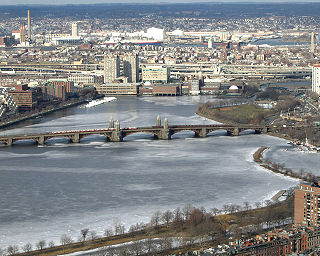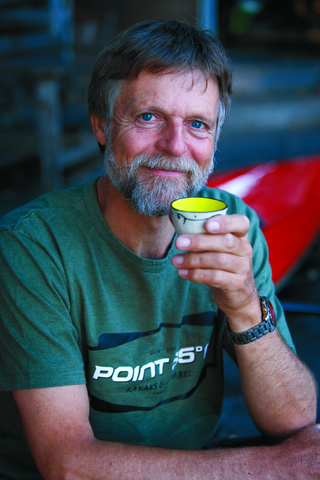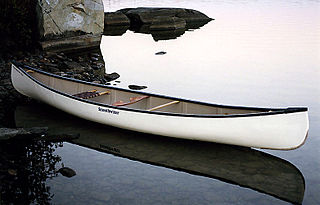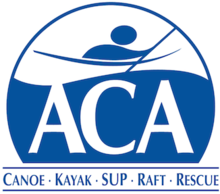
Kayaking is the use of a kayak for moving over water. It is distinguished from canoeing by the sitting position of the paddler and the number of blades on the paddle. A kayak is a low-to-the-water, canoe-like boat in which the paddler sits facing forward, legs in front, using a double-bladed paddle to pull front-to-back on one side and then the other in rotation. Most kayaks have closed decks, although sit-on-top and inflatable kayaks are growing in popularity as well.

The Charles River, sometimes called the River Charles or simply the Charles, is an 80-mile-long (129 km) river in eastern Massachusetts. It flows northeast from Hopkinton to Boston along a highly meandering route, that doubles back on itself several times and travels through 23 cities and towns before reaching the Atlantic Ocean. The indigenous Massachusett named it Quinobequin, meaning "meandering" or "meandering still water".
Canoe polo, also known as kayak polo, is one of the competitive disciplines of kayaking. The sport is also known simply as "polo" by its players and supporters.

Canoe camping, also known as touring, tripping or expedition canoeing, is a combination of canoeing and camping. Canoe campers carry enough with them to travel and camp for several days via a canoe.

Canoe freestyle is a discipline of whitewater kayaking or canoeing where people perform various technical moves in one place, as opposed to downriver whitewater canoeing or kayaking where the objective is to travel the length of a section of river. Specialised canoes or kayaks (boats) known as playboats are often used, but any boat can be used for playing. The moves and tricks are often similar to those performed by snowboarders, surfers or skaters, where the athlete completes spins, flips, turns, etc. With modern playboats it is possible to get the kayak and the paddler completely airborne while performing tricks. The competitive side of playboating is known as freestyle kayaking.

Canoe sprint is a water sport in which athletes race in specially designed canoes or kayaks on calm water over a short distance. The sport is governed over by the International Canoe Federation and it is one of the two kayaking and canoeing disciplines at the Summer Olympics. The other Olympic canoeing discipline is canoe slalom.
Canoe sailing refers to the practice of fitting an Austronesian outrigger or Western canoe with sails.
The Royal Canoe Club (RCC), founded in 1866, is the oldest canoe club in the world and received royal patronage in the 19th century. The club promotes canoeing and kayaking, focusing on flatwater, sprint and marathon disciplines. Members of the club have represented Great Britain at World Championships and the Olympic Games. The club is based at Trowlock Island on the River Thames in Teddington near London. The premises are also used by Walbrook Rowing Club, The Skiff Club and Kingston Royals Dragon Boat Racing Club.

John MacGregor, nicknamed Rob Roy after a renowned relative, was an English explorer, travel writer and philanthropist. He is generally credited with the development of the first sailing canoes and with popularising canoeing as a sport in Europe and the United States. He founded the British Royal Canoe Club (RCC) in 1866 becoming its first Captain and also founded American Canoe Association in 1880.

The Rideau Canoe Club (RCC) is a canoe club located on the Rideau River in Ottawa, Ontario, Canada. The club is located at Mooney's Bay, where the Rideau Canal splits away from the river prior to joining up with the Ottawa River.

A sprint canoe is a canoe used in International Canoe Federation canoe sprint. It is an open boat propelled by one, two or four paddlers from a kneeling position, using single-bladed paddles. The difficulty of balance can depend on how wide or narrow the canoe is, although regularly the less contact a canoe has with the water the faster it goes. This makes the narrower boats much faster and popular when it comes to racing.

Canoe diving and Kayak diving are recreational diving where the divers paddle to a diving site in a canoe or kayak carrying all their gear in or on the boat to the place they want to dive. Canoe or kayak diving gives the diver independence from dive boat operators, while allowing dives at sites which are too far to comfortably swim, but are sufficiently sheltered.
The Hawkesbury Canoe Classic is an annual marathon canoe race taking place on the Hawkesbury River in Northwest Sydney usually at the end of October. The Hawkesbury Canoe Classic consists of a 111 km paddle downstream starting in Windsor and finishing in Mooney Mooney. The race is Australia's fourth-longest annual canoe race after the 404 km Murray Marathon, the 208 km Riverland Paddling Marathon on the Murray River between Martins Bend and Morgan in South Australia and the 133 km Avon Descent in Western Australia. The Hawkesbury Canoe Classic has over 600 paddlers each year. Around 600 paddlers travel 111 km in moonlight, down the Hawkesbury River from Windsor to Brooklyn, to raise money for Charity. Over the years the Hawkesbury Classic has developed into a great event. Paddlers, their land crew and hundreds of volunteers converge on the banks of the Hawkesbury River at Windsor on the day of the event to enjoy the fun and competition of an overnight paddle, and the now famous camaraderie and spirit of the event. Paddlers leave Windsor between 4pm and 6pm on Saturday and pass 20 safety checkpoints during the night. The fastest craft arrive at Brooklyn on Sunday morning in less than 10 hours, but the average time is closer to 15 hours. The classic began in 1977 and is made possible by volunteers who put in hundreds of hours of time throughout the year, the landowners who allow the use of their land for the weekend and the paddlers and their support crews. The Classic has raised more than $3.3 million for medical research, the major beneficiary continues to be will be the Arrow, The Bone Marrow Transplant Foundation.

Canoe Kayak Canada is the governing body of competitive canoeing and kayaking disciplines in Canada. The three specific disciplines represented are flatwater, whitewater and marathon. Canoe Kayak Canada officially replaced the name "Canadian Canoe Association" in 2005, although the former title is still used by the organization. The name change came about from a desire to include the kayaking discipline in the organization's name.
The Philadelphia Canoe Club (PCC) is one of oldest paddling organizations in the United States. Headquartered in an 18th-century mill at the confluence of the Wissahickon Creek and Schuylkill River in the Manayunk section of Philadelphia, PCC counts among its members more than 200 canoeists and kayakers who take scores of trips every year on local rivers and streams as well as numerous waterways throughout North America.
High Adventure Bases of the Boy Scouts of America are outdoor recreation facilities located in several locales in North America operated by the Boy Scouts of America at the organization's national level. Each facility offers wilderness programs and training that could include wilderness canoeing, wilderness backpacking trips, or sailing, and provide opportunities for Scouts to earn the 50-Miler Award. These bases are administered by the High Adventure Division of the National Council of the Boy Scouts of America.

Canoeing – recreational boating activity or paddle sport in which you kneel or sit facing forward in an open or closed-decked canoe, and propel yourself with a single-bladed paddle, under your own power.

Nigel Foster is an English sea kayaker, kayak designer, instructor and author. He is the first and youngest paddler to circle Iceland by kayak.
Julio Ko is a Korean sea kayaker and outdoor educator who has trained students and children in adaptive paddling and water sports safety since 2009.

Canadian is the byname used in some countries for the descendants of the birch bark canoe that was used by the indigenous peoples of Northern America as a convenient means of transportation in the densely forested and impassable areas of Northern America.













